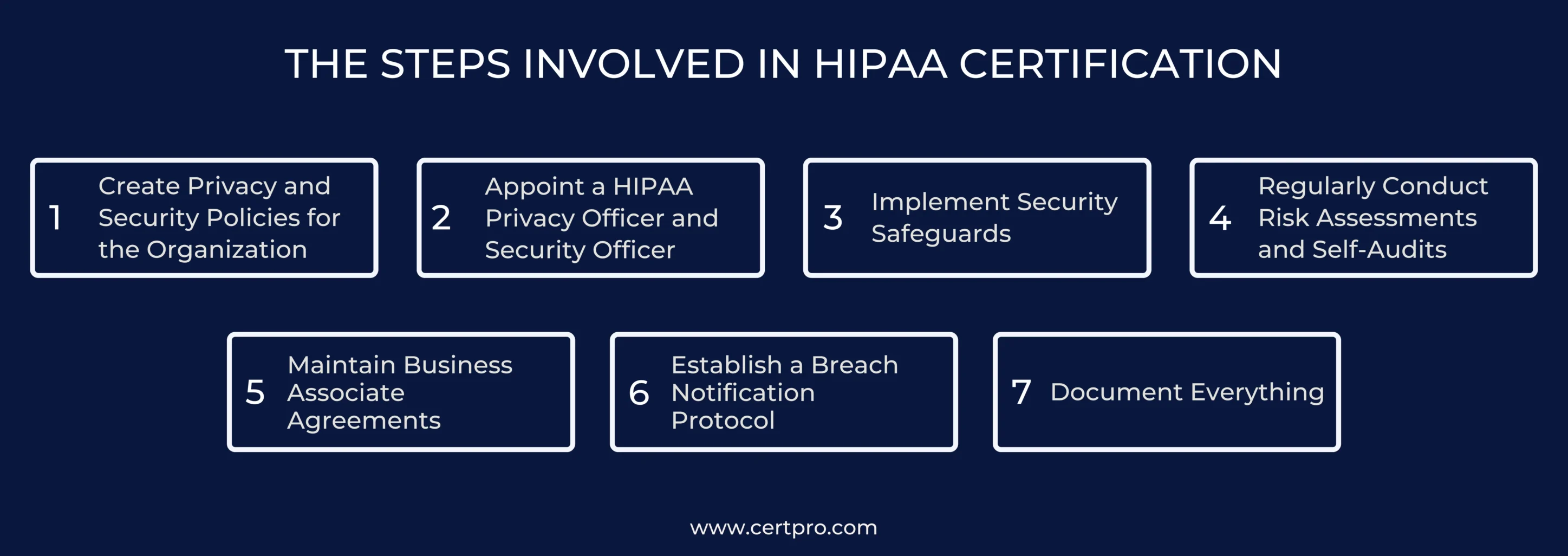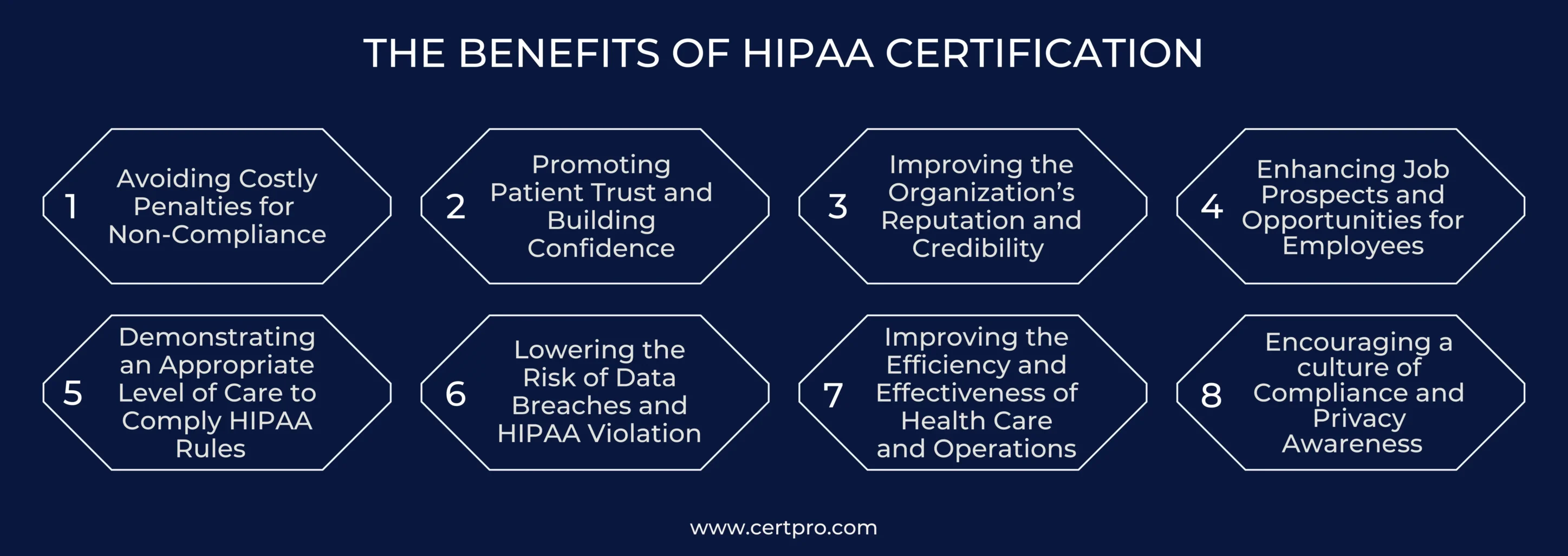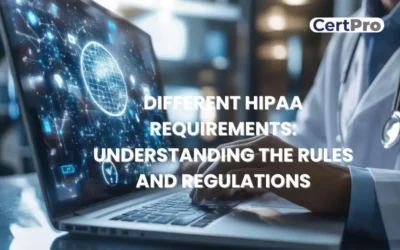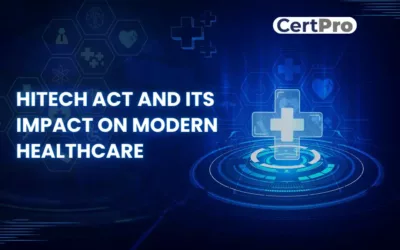HIPAA
HEALTH INSURANCE PORTABILITY AND ACCOUNTABILITY ACT
Health Insurance Portability and Accountability Act (HIPAA) rules say how to keep private patient information safe. A business must follow HIPAA rules concerning protected health information (PHI). HIPAA compliance certification is needed for covered organizations and business partners related to healthcare facilities. It is still necessary to go through an official certification program run by the US Department of Health and Human Services (HHS). The HHS says to keep certain health information safe. The Security Rule establishes national security guidelines for protecting certain types of health information.
Obtaining HIPAA compliance certification enhances an organization’s reputation and builds trust by demonstrating a dedication to privacy and security. Therefore, it lessens the possibility of fines related to non-compliance. Hence, HIPAA compliance certification emphasizes a proactive approach to protecting PHI.

HIPAA Compliance Audit Services by CertPro
CertPro helps you with HIPAA compliance certification and auditing services. Thus, we accomplish thorough checks to ensure that organizations meet the strict rules. This helps build trust in the competitive market. Hence, our skilled professionals review security, availability, integrity, privacy, and privacy rules and create a detailed HIPAA record. This certification helps people believe and trust you. It shows that you care about keeping your patients’ data safe. You can count on CertPro for skilled HIPAA advice. We help you keep up with the new rules for protecting your information.
Why choose CertPro for HIPAA certification and auditing?
CertPro provides low-cost HIPAA compliance certification services around the world. We know how important it is to keep certification prices low while following HIPAA rules. Therefore, our custom approach ensures you only pay for your tailored services. Thus, our services simplify way, cut down on operating disruptions, speed up certification, and make the best use of resources. CertPro assures you that our cost-effective HIPAA compliance certification will benefit you. In addition, we offer affordable prices as we avoid the hidden cost of auditing without compromising the quality.
| Factors | CertPro Advantage |
|---|---|
| Time to Certification | 4x faster than traditional approaches |
| Price | Competitive rates with flexible options |
| Process | Streamlined and efficient methodology |
| Expertise | 10+ years of industry experience |
CertPro’s Cost-Effective Approach to HIPAA Certification
CertPro gives HIPAA compliance certification services at a low cost. We know how important it is to cut costs and follow the rules. Thus, we tailor our services to your needs; you only pay for what your business needs, which saves you money. We keep delays to a minimum and make the best use of resources to ensure the compliance process goes smoothly. CertPro offers affordable and valuable ways to ensure that HIPAA rules are followed without lowering the quality of the work. Hence, CertPro provides an economical way to meet HIPAA requirements.
| No. of employees | Timeline | Cost (approx.) |
| 1 – 25 | 4 weeks | 2500 USD |
| 25-100 | 6 weeks | 3500 USD |
| 100-250 | 6-8 weeks | 5000 USD |
| 250 plus | 8 weeks | Custom plans |
HIPAA: A Comprehensive Overview
The Health Insurance Portability and Accountability Act (HIPAA) was enacted in 1996. HIPAA certification ensures that places adhere to rules for safeguarding health information. This means checking how a company follows the rules and uses technology. The aim is to prevent unwanted access, use, or disclosure of patient data.
Furthermore, HIPAA certification confirms many things. Businesses must have the right managerial, physical, and computer safeguards to keep PHI safe. All employees must have been trained on HIPAA regulations. In addition, risk assessments need to be done regularly. In conclusion, businesses need ways to inform people about security holes and show them how to fix them. A company’s HIPAA compliance certification comp shows it cares about keeping customer health information safe.
The Privacy Rule: PHI is defined as individually identifiable health information, and the Privacy Rule lays out standards for safeguarding it. PHI use and disclosure are restricted, and individuals must consent to specific uses. People also have control over the information about their health.
The Security Rule: However, the Security Rule describes how to protect electronic PHI (ePHI). It guarantees its availability, secrecy, and integrity. Organizations must use different security measures to stop unauthorized access to health data online.
HIPAA aims to protect health information and privacy. It ensures that information is shared for optimal healthcare and protects private information. HIPAA regulations govern online health information exchange. While maintaining privacy, it permits using information for medical purposes and bill payments.
In conclusion, HIPAA provides consumer control over personal data while establishing regulations to safeguard health information. Medical facilities adhere to these regulations using technology and safety procedures.
THE STEPS INVOLVED IN HIPAA CERTIFICATION
These steps will guide you on how to become HIPAA compliant.
Create Privacy and Security Policies for the Organization: First, clear your privacy policies. Next, create thorough security policies that adhere to HIPAA rules. Both the Security and Privacy Rules are vital regulations that must be followed. Ensure there is no space for interpretation and that these policies are unambiguous. Explain your protected health information (PHI) management procedure.
Appoint a HIPAA Privacy Officer and Security Officer: Choose a security officer and a HIPAA privacy officer. They will supervise and implement the security rules and ensure compliance.
Implement Security Safeguards: After that, security measures to preserve PHI are installed. This includes technical safeguards like encryption, access limits, and secure ePHI storage. Physical safeguards such as secured PHI disposal sites and locked doors to PHI storage facilities must also be in place.
Perform Risk Assessments and Self-Audits Frequently: Make regular assessments of the risks. This aids in identifying PHI threats and vulnerabilities. Perform self-audits to ensure HIPAA compliance. These evaluations facilitate the identification of areas for improvement and permit remedial action.
Maintain Business Associate Agreements: Make official contracts with partners with whom your company shares health information. These are called Business Associate Agreements (BAAs). They explain how to keep information safe and follow HIPAA rules. Keep records of these agreements.
Establish a Breach Notification Protocol: Develop a protocol for breach notifications. Then, take a list of actions to take in case of a PHI-related security incident or data breach. As HIPAA mandates, this includes evaluating the breach and reducing risks, notifying parties impacted, and reporting the incident.
Document Everything: Finally, maintain thorough documentation of your HIPAA compliance efforts. This covers BAAs, training materials, risk assessments, self-audit reports, policies, and procedures. Accurate documentation aids in audits and demonstrates your dedication to compliance.
However, maintaining HIPAA compliance certification is an ongoing process that requires constant attention. You must update rules, stay informed about changes, and regularly check your procedures.

Why should your organization achieve HIPAA compliance?
Businesses that protect individuals’ health information adhere to HIPAA regulations. Employees receive emergency and sensitive information handling training. Hospitals that use PHI must also adhere to HIPAA to maintain patients’ trust and legal compliance. HIPAA regulations are crucial because they safeguard private health information.
Legal Requirements: HIPAA requires healthcare organizations to protect patient information. Observing these guidelines aids in their problem avoidance.
Protecting Patient Privacy: HIPAA ensures that information is safe during exchange, retrieval, and storage to protect the privacy of medical records.
Preventing Data Breaches: Moreover, HIPAA compliance certification enforces robust security measures. For example, it uses encryption and access controls. These prevent unauthorized access and data breaches. Thus, it protects patients from identity theft and fraud.
Improving Patient Care: Compliance can also improve patient care. It allows secure electronic health records (EHRs) and streamlined workflows. Access to accurate patient information enhances care coordination, enabling better-informed treatment decisions.
Building Trust with Business Partners: A corporation demonstrates its concern for patient information security by adhering to HIPAA regulations. Thus, it creates trust, and customers feel safe while sharing their information.
Avoid Costly Penalties: Violations of HIPAA regulations can have significant financial consequences. Businesses may incur penalties or face legal issues. Obtaining certification for HIPAA compliance reduces costs and aids in problem prevention.
Obtaining HIPAA compliance certification is crucial for healthcare facilities. It safeguards the law, ensures data security, and keeps patient information private and safe. Along with improving patient care, this fosters trust among various groups and prevents hefty fines. Thus, adherence to this is crucial.

What are the HIPAA certification requirements?
HIPAA compliance specifies additional requirements for protecting health information within the firm. Here are a few specific criteria:
Privacy Rule: Any firm hoping to comply with HIPAA laws must implement strong security measures to safeguard people’s personal health information (PHI). This rule allows people to view and manage their health information. Permission must be obtained for some uses and disclosures of PHI.
Security Rule: To comply with HIPAA regulations, enterprises must implement robust security measures for electronic health information (ePHI). This includes technical, administrative, and physical security measures like passwords and protected areas. To ensure the security of ePHI, organizations must create and implement plans to address possible security risks and provide staff training.
Breach Notification Rule: Companies must notify the government and the individuals impacted when someone inadvertently divulges sensitive health information. They may also have to deliver the news.
Business Associate Agreements (BAAs): Companies handling health information must sign contracts with all their partners, including suppliers and contractors. These contracts guarantee that health information is protected and that all parties follow HIPAA standards.
Documentation and Recordkeeping: Businesses must maintain records of their policies, emergency protocols, and other pertinent data for the duration specified by HIPAA to demonstrate compliance with the regulations.
Enforcement: The Office for Civil Rights (OCR) at HHS oversees compliance with HIPAA regulations. Audits and investigations verify compliance. Companies that violate the regulations risk sanctions.
Certification and Audits: HIPAA compliance certification is not compulsory. However, companies may have independent third parties audit them voluntarily. By highlighting areas for improvement and compliance gaps, these audits show a dedication to patient privacy and security protection.
Note: This broad rating may change depending on the firm’s characteristics. Visit CertPro.com and contact us for a more thorough explanation.
THE BENEFITS OF HIPAA CERTIFICATION
HIPAA compliance certification is beneficial for healthcare businesses. For starters, it can make patients feel better about themselves. Second, it protects against too high fines for not following the rules. Third, it gives businesses an edge in the market. Thus, Protected Health Information (PHI) is kept private and safe. In conclusion, getting HIPAA certification has these critical benefits:

ELIGIBILITY FOR HIPAA CERTIFICATION
Businesses involved in healthcare facilities need to get a HIPAA compliance certificate. Hospitals, dentist and doctor offices, health insurance companies, and pharmacists are all covered businesses that use computer means to send and receive health information. Therefore, business partners do more than manage protected health information (PHI). They also offer other services to covered groups. Some of these businesses are computer storage providers, experts, and billing firms. How a company must follow HIPAA rules depends on its situation. HIPAA compliance certification must obey laws that protect patient privacy and keep health information safe.
COST OF HIPAA CERTIFICATION
The cost of HIPAA certification can vary widely. It depends on factors like organization size, complexity of work, and need for external help. Costs typically include risk assessment, policy creation, staff training, security measures, and technology updates. Ongoing expenses for audits and compliance are also ordinary.
It’s important to note that the government does not provide official HIPAA certification or a certification body. Therefore, costs depend on the resources used to comply with HIPAA rules. While HIPAA certification isn’t free, following its rules incurs expenses. Therefore, Costs differ based on organization size and complexity.
VALIDITY PERIOD OF HIPAA CERTIFICATION
In contrast to certifications, HIPAA compliance certification is permanent. An organization never reverts to its previous state of compliance. All HIPAA standards, including Security and Privacy rules, must be followed to comply. Adjust procedures, security, policies, and staff training for new risks. Regularly audit, assess risks, and conduct checks to stay compliant. Organizations handling PHI must follow HIPAA guidelines. Compliance has no fixed time frame.
Supporting Your Business in Achieving HIPAA Certification
HIPAA compliance certification shows businesses are dedicated to following privacy rules. CertPro offers customized strategies for your compliance. Therefore, our trained and experienced team will help the process go smoothly. In addition, we provide ongoing help and advice that improve your business opportunities. CertPro offers services that strictly follow HIPAA privacy and security rules, ensuring customers get complete help throughout the certification process.
Our intelligent, cost-effective methods also provide helpful information to improve your company’s data security policies. Therefore, if you hire CertPro as your HIPAA compliance consultant, you can improve data security and build trust. Hence, these projects are significant for growing your business and making the healthcare industry grow in a lasting way.
FAQ’s
Is there an official HIPAA certification?
No, the U.S. Department of Health and Human Services (HHS) does not endorse an official HIPAA certification program. Compliance is self-attested, and organizations may undergo audits or assessments by third-party experts to validate their compliance efforts.
What are the penalties for HIPAA violations?
Penalties for HIPAA violations can range from monetary fines to criminal charges, depending on the severity and nature of the violation. Fines can range from $100 to $50,000 per violation, with an annual maximum of $1.5 million for each violation category.
What are the main components of HIPAA compliance?
The main components of HIPAA compliance include implementing administrative safeguards (policies and procedures), physical safeguards (physical security measures), technical safeguards (technical security measures), and organizational requirements (training, documentation, and risk management) to protect the privacy and security of protected health information (PHI).
What happens if a business associate experiences a data breach?
If a business associate experiences a data breach, they must promptly notify the covered entity. According to HIPAA regulations, the covered entity then notifies the affected individuals, the Secretary of Health and Human Services, and possibly the media of the breach.
Does the issuance of a Notice of Proposed Rulemaking guarantee that changes will be made to the HIPAA Rules?
No, the issuance of a Notice of Proposed Rulemaking (NPRM) does not guarantee that changes will be made to the HIPAA Rules. An NPRM is a formal announcement of proposed changes, and the final rule is determined after a public comment period and review by the regulatory agency, which may result in revisions or no changes at all.
DIFFERENT HIPAA REQUIREMENTS: UNDERSTANDING THE RULES AND REGULATIONS
With increasing cyberattack trends, organizations must take appropriate measures to secure their lifeblood. Similarly, patient health and financial information need protection in the healthcare sectors. Therefore, the Health Insurance Portability and Accountability...
HITECH ACT AND ITS IMPACT ON MODERN HEALTHCARE
In 2009, the Health Information Technology for Economic and Clinical Health or HITECH Act was signed to transform the American healthcare industry. The laws worked as a forward-thinking process of changing patient services. In this regard, the Patient Protection and...
BEST PRACTICES FOR DATA PROTECTION IN THE HEALTHCARE INDUSTRIES
In the healthcare sector, safeguarding sensitive information about patients is extremely important. Patient data includes personal details, medical histories, and treatment plans. Therefore, it must be protected and should be confidential. Thus, breaches not only...



